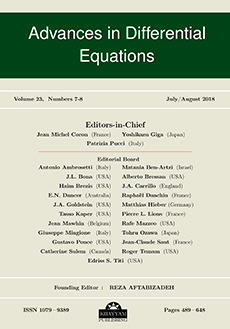Abstract
This paper studies the large time behavior of nonnegative solutions of $$ u_t = u^p \Delta u - u^{-q} \chi_{\{u>0\}} \qquad \mbox{in } \Omega \times (0,\infty), \qquad p \ge 1, q>-1, $$ with prescribed boundary values $u|_{{\partial\Omega}}=1$ in smoothly bounded domains $\Omega \subset \mathbb R^n$. The particular interest here is in the question of how the interplay of strongly degenerate diffusion and strong absorption influences the evolution of the dead core set $\{u(t)=0\}$ (which is enforced to be nontrivial for all time by the assumption that the initial data $u_0$ vanish in some ball). The main results state that there exist four parameter regimes in which, widely independent of $u_0$, all solutions undergo
(i)a complete extinction at time $t=0$ ($q>p-1$)
(ii) a total extinction in finite but positive time ($0 <q\le p-1$),
(iii) an extinction in infinite time ($1-p <q <0$), or
(iv) no extinction ($q <1-p$),
respectively. Specifically, the first two types of behavior are in sharp contrast to the non-degenerate and weakly degenerate cases $p=0$ and $p \in (0,1)$, respectively, where only (iv) occurs.
Citation
Michael Winkler. "The evolution of dead cores in strongly degenerate diffusion problems." Adv. Differential Equations 13 (11-12) 1001 - 1030, 2008. https://doi.org/10.57262/ade/1355867284
Information





